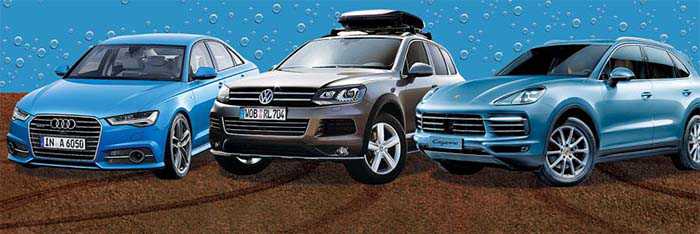Probe Finds Volkswagen Guilty of Another Emission Scam
22 August, 2019

Volkswagen was found guilty on Tuesday for cheating on diesel emissions after a lengthy government probe of German cars in Korea.
The Environment Ministry said that diesel cars that ostensibly met the latest Euro 6 standards were equipped with emissions-rigging cheats that fooled testers by increasing the amount of toxic fumes only at sustained higher speeds.
They are the Audi A6 and A7, Volkswagen Touareg and Porsche Cayenne sold from August 2014 to January 2018, when the company was already embroiled in an emissions-cheating scandal.
A fluid made of urea and water known by the commercial name AdBlue is used to break down carcinogenic nitrogen oxide found in diesel exhaust into water and nitrogen. AdBlue is a key element of cutting-edge catalytic converters to meet the latest Euro 6 emission standards.
But diesel cars need to disperse AdBlue frequently to break down nitrogen oxide to meet Euro 6 standards, which necessitates large storage tanks. Increasing their size lowers fuel efficiency and reduces trunk space, and German automakers were caught by EU authorities in June 2017 of colluding to reduce the size of their AdBlue tanks.
In late 2017, German environmental authorities ordered the recalls of any diesel cars that dispersed lower levels of AdBlue during actual driving compared to levels recorded during emissions tests.
The vehicles identified by the ministry here rigged software so they emitted less AdBlue when traveling at more than 100 km/h for long distances carrying three to four passengers if levels of the fluid were low.
Ministry officials plan to fine Volkswagen as well as order recalls and press criminal charges. Owners will face some inconvenience such as reduced fuel efficiency and having to refill AdBlue frequently. Some are suing. Attorney Ha Jong-seon said, "Already around 30 owners have filed lawsuits demanding their money back."
No cars produced since January 2018 were involved in the scandal since the sale of flawed cars were stopped after the German government issued the recall order in late 2017.
The ministry did not find any evidence of emission rigging by Mercedes Benz.
The latest diesel cars produced in Europe meet toughened emission regulation, yet few of them are imported to Korea, which adopted the new Worldwide Harmonized Light Vehicle Test Procedure in September last year. The procedure, a global standard for determining the levels of pollutants and CO2 emissions as well as fuel consumption, is based on real-driving rather than test conditions.
Audi failed to get a single diesel car authorized for sale in Korea this year under the new test procedure, while Volkswagen recently got the green light for the Arteon sedan.
With that the myth of "clean" diesel has been thoroughly busted. Yoo Ji-woong at eBest Investment Securities said, "Diesel versions of SUVs and other large cars are still viable options, but the evolution of electric and hydrogen-fueled vehicles has created more alternative choices. European carmakers are just stopping development of new diesel cars."
